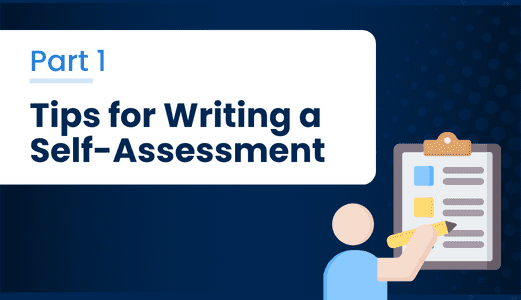The idea of the “self-assessment” has broken even the strongest of accounting and finance professionals. Those who pride themselves on their confidence in their work feel helpless to the idea of doing one of these. We have compiled a handy guide on how to navigate the self-assessment phenomenon and come out on top (and less scared of it).
As an accounting or finance professional, you know that the only thing worse than your yearly/bi-annual performance review is…your yearly/bi-annual self-assessment. It’s one thing to have your performance at your finance job evaluated and reviewed by your superiors, and another to have to do so yourself.
At first glance, the task of writing a self-assessment – something managers are calling for ever more frequently – seems like a fairly brutal one. For most people, there’s something intensely nerve-racking about having to comment on yourself – even, or especially, if what you have to say is positive. Many fear that they’ll write something glowing about themselves, only to have their manager harshly disagree.
Research shows, however, that most people are harder on themselves than their bosses (even when the latter are demanding). In reality, the process doesn’t have to be as gruelling as it sounds. Using the following tips to guide you, it’s entirely possible to emerge from your self-assessment unscathed – and, ideally, with a stronger rapport with your boss.
A self-assessment is the start of a dialogue
While companies vary in terms of their corporate cultures, finance jobs today are generally performed in a less micromanaged, more independent, and sometimes physically remote capacity. Managers, as a result, are far less likely to be constantly breathing down their employees’ necks (unless they’re the bullying type). While this can mean greater empowerment for employees and opportunities for you to take the initiative, it also means your manager is probably less aware of your daily activities and interactions.
Instead of dreading your self-assessment, think of it as a chance to open up a dialogue with your employer. What you write should give your boss a clear picture of what you do and how you do it at your finance job, as well as the challenges you face and things you’d like to improve upon.
Once your employer has had a chance to digest everything, you should be able to sit down with them and have a more informed and open conversation about what you’re doing well, where you need help or encouragement, and what, concretely, you both need from each other (or from others on your team).
Clarify your role
Since you might not be engaged with your boss on a daily basis, your self-assessment provides an opportunity for you to describe your precise role – or core function – and how it contributes to the overall operations at your finance job.
By doing this, you can demonstrate to your bosses that the function you provide is an invaluable one – and that you, in turn, are indispensable to the company. You can also clarify your key responsibilities. If there are discrepancies between how you view your role and how your boss sees it, opening up the lines of communication and engaging in a transparent conversation will help to clear up the confusion.
Be specific and be numbers-oriented
Specificity is key for your finance job self-assessment. It’s important that you list what you’ve accomplished over the past year in close and intimate detail. For an accounting job, for example, don’t say: “I helped streamline the transactional reporting process.” Instead, write something like: “Earlier this year, I spent four months, from September to January, reorganizing the company’s QuickBooks files so that the recorded transactions were clearer and more readable.”
Further, it’s important to be numbers-oriented on your finance job self-assessment. As an accountant or someone working in a finance role, this shouldn’t be hard to do. Numbers never lie; they’re a clear and punchy way to communicate to your employer your value to the company. Instead of just writing that you helped boost company revenue, describe how many new clients you brought in over a certain period of time, as well as the profits that you were able to generate.
Avoid modesty
A self-assessment is not the place for modesty. You might feel awkward about itemizing your strengths or heaping praise on your own accomplishments. But if you don’t show confidence in yourself professionally, who will?
If you’re debating between two rankings – say, a two or a three out of five – always opt for the higher one. If you did something positive or constructive, note it. And if you generally consider yourself a valuable employee and member of the team, let it be known, in no uncertain terms.
Writing a self-assessment at your finance job can feel like a trap. In reality, it’s a great opportunity to spark a discussion with your employer and to reflect on your role at the company. There aren’t many occasions when you will be able to impress upon them the things you do well, or to identify the kinds of help and support you need to improve. So take full advantage of it! If you’re interested in some finer details for preparing your finance job self-assessment, check out some self-assessment examples and continue on to read Part 2 here.




